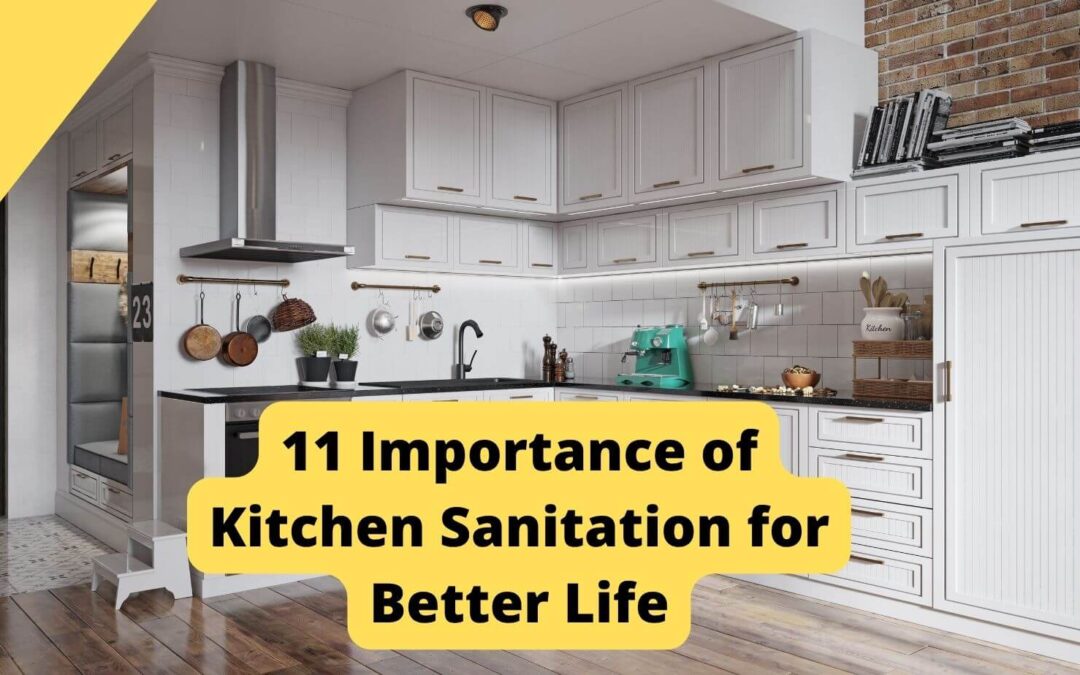The act of cooking is essential to our daily lives, but the result is an extremely messy kitchen. On the other hand, a clean and sanitized kitchen undoubtedly helps keep us healthy. Although cleaning the kitchen can be time-consuming, it has some significant benefits.
Here are some importance of kitchen sanitation that you should always follow and maintain.
1. Improve Hygiene and Prevent Foodborne Illness
A messy kitchen may cause foodborne illnesses caused by the growth of bacteria and germs on oil and grease deposits. The bacteria contaminate the food you are preparing or have already prepared, resulting in diarrhea or other dangerous diseases. Therefore, for better hygiene, it is important to clean your dishes and major kitchen appliances and sanitize surfaces like cabinets, countertops, stovetops, chimneys, etc.
Foodborne illnesses due to spoilage or cross-contamination are one of the biggest concerns about cleanliness in the kitchen. Of course, you’re aware of the importance of kitchen sanitation and safety precautions like using different cutting boards for meat and vegetables, washing your hands after handling raw meat, and regularly cleaning the sink and countertops. But, this is just the beginning.
In the United States, the Centers for Disease Control (CDC) reports about 76 million cases of foodborne illness every year. The contamination comes from all sources, including food manufacturing, but that figure is still shocking.
Salmonella, Campylobacter, pathogenic E Coli, and Listeria are some of the culprits found in food. In addition, viruses can be transmitted to food from unwitting human carriers and then spread to others in the household. The list includes hepatitis A, Staphylococcus aureus, Salmonella, Shigella sonnei, and rotavirus. The risks of foodborne illness are higher for young children, older adults, and those who are already sick, but even a mild case of food poisoning should be avoided.
2. Minimize household use of harsh chemicals
When dealing with messy situations, it is easy to think that heavy artillery needs to be brought in. However, cleaning agents in kitchens and bathrooms kill germs because they contain a string of high-concentration chemicals that get the job done but can also leave residue behind.
Humans are not immune to the biological effects of strong anti-bacterial agents, and keeping a clean home using safe practices can be challenging. Cleaning the kitchen regularly helps keep bacteria at bay, so you have fewer problems with them. In addition, the chemicals you use, whether you go green or use a more aggressive, powerful option, will be available in reduced concentrations at all times. You know what we mean if you’ve spent an entire weekend cleaning, only to make your house smell like you’re preparing a chemical stew.
It’s great to think about kitchen sanitation with wholesome products like white vinegar, a mild but effective acid, and baking soda, a mild abrasive. But regardless of whether you go this route, a little regular cleaning will produce lower concentrations of harsh chemicals and fewer chances for dangerous exposure than a quarterly cleaning marathon.
3. Embarrassment-free entertainment
When you have company, you might prefer to have the kitchen all to yourself, but folks are usually drawn to see what’s happening in the kitchen. This is where all the action happens. Don’t be surprised if your tidy living room is empty and your guests are laughing and having a good time standing near the garbage bag you just filled with corn husks.
Despite life’s unfairness, the kitchen is the heart of the home. Unfortunately, it can also be the dirtiest room in your house. Expect the unexpected by getting your kitchen in shape and keeping it that way before your guest recounts when she opened your refrigerator and found a block of cheese covered with inch-thick mold.
4. Keep Kitchen Appliances Long Lasting
Well-maintained appliances work more efficiently. In contrast, your smoke hood, dishwasher, toaster, food processor, and filters will have to work twice as hard if left unclean. Eventually, these appliances will suffer major technical issues, resulting in a reduction in their lifespan.
The kitchen has the most appliances in most homes, and we’re not just talking about the big stuff. Keeping your garbage disposal, range hood, dishwasher, toaster, coffee maker, food processor, and other appliances clean will improve their performance.
A clean appliance will run more efficiently. When a vent or filter is clogged, an appliance has to work harder to perform. It will also likely operate at a higher temperature. You’ll have a shorter useful life for that electric knife or potato peeler than if you kept it clean. Does a little dust or grease harm your countertop gadgets? Yes, but the effects are cumulative, and prolonged neglect will do more than leave your appliances sticky and unsightly.
5. Make Kitchen Preparation Easy
Preparing the kitchen for cooking is easier when everything is out of the way.
It is dinnertime, and you are exhausted. The dishes from this morning are on the counter where you plan to chop onions, and the garbage disposal is clogged with salad debris. To prepare a meal, you’ll need to clean your kitchen first. Trying to cut a few seconds from dinner prep to get off your aching feet, you curse the person who left the sponge full of pasta sauce.
You probably agree that cleaning when you’re tired or in a hurry is not a good idea. Raise your hand if you have sticky countertop residue. It probably takes longer to clean sticky surfaces in the long run. It may take 10 minutes to clean a countertop well, where you take everything off the counter and do it right. By the end of the week, dragging a rag around your countertop appliances, the mail basket, and the bread box twice a day for a quick clean could add up to a lot more minutes. If you start cleaning regularly, you’ll save a few steps and keep your frustration meter in the green.
6. Food costs can be reduced
There are many appliances in the kitchen in most homes, and we aren’t just talking about the big stuff. Having clean garbage disposals, range hoods, dishwashers, toasters, coffee makers and food processors will improve their efficiency. More efficiency means longer life.
It is more difficult for an appliance to function when a vent or filter is dirty. This usually results in it working hotter. Therefore, the electric knife or electric potato peeler will have a shorter useful life than if you kept it clean. Can you trust your countertop gadgets to withstand a little dust and grease? Unfortunately, the effects of prolonged neglect are cumulative, and they will do more than make your appliances sticky and unsightly.
7. Don’t Set a Bad Example for Your Children
You might think that all those cereal boxes cluttering your kitchen countertops and the dishes you use directly from the dishwasher instead of putting them away are a compromise you can handle when life is less hectic. However, what you do – or do not do – will leave an impression on your children. Although they won’t love you less if you never clean out the ice-dispenser tray, they may adopt your less desirable cleaning habits in the future. Cleaning may not have the almost religious importance previous generations of housekeepers attributed to it, but it is a good habit to instill in your children.
8. Get rid of stains and odors
When your kitchen is not regularly cleaned, it may spread nasty odors all over your house. Bad smells or odors are bacterial indicators. There is usually a foul smell emanating from the kitchen when something has gone bad or rotten & there has been a buildup of bacteria. To maintain proper kitchen hygiene, you must keep the odor away.
9. Be Safer
Hot surfaces, open flames, and other potential hazards are always present in the kitchen. Additionally, fats tend to spread flames more quickly. Often, kitchen fires are caused by oil buildup on stove hoods or food residue in the oven. Furthermore, it could cause long-term damage to your property and health. Thus, it would be best to remove those oil deposits before they cause any damage.
The need for cleanliness goes beyond aesthetics. It is a matter of safety as well. An oil slick on the stove from taco night may start a fire, and drips on the floor from yesterday’s margarita disaster could cause someone to fall. The kitchen is where water, high heat, electricity, and sharp objects come together. Cleanliness and organization are the keys to controlling this potentially dangerous environment.
The last thing anyone plans is to start a kitchen fire, slip on maple syrup, or drop a greasy knife’s blade on a toe. You might be able to avoid calamity by maintaining a clean kitchen, so you’re not the guy who ends up in the emergency room after a silly kitchen accident.
10. Increase the efficiency of food management
It is important to have an effective and consistent food maintenance strategy in the kitchen. The kitchen must have an effective and consistent food maintenance strategy. Milk turns relatively quickly, so keeping your fridge clean and organized will help you keep track of food stores and use them before they spoil. You won’t be able to monitor what goes on inside your refrigerator when it looks like it might be due for a visit from the health department. Decomposing food will produce odors and bacteria that can affect other foods, and if you leave spills in place, you can risk cross-contamination.
Another place to watch is the cupboard. While canned foods may be relatively indestructible, baking powder, spices, nuts, and other products should be monitored. You may be able to turn that loaf of whole wheat bread into breadcrumbs before the freshness date elapses. When checking around, see if there are any insects active and vacuum up any flour, food crumbs, or dust. Spilled, spoiled, and neglected food can breed legions of bacteria and invite insect invaders.
When you wait for the next holiday to start cleaning, your bread may go moldy, and a thriving community of weevils may move into your flour, dried pasta, and other packaged foods. Using food to its best advantage requires regular cleaning and maintenance since it is perishable. Using food to its best advantage requires regular cleaning and maintenance since it is perishable.
11. A happy kitchen makes a happy home
A happy kitchen helps to make a happy family. Why? Because a healthy & clean kitchen improves your mental state & removes the stress that an unclean place can bring. Not to mention that it also encourages you to cook delicious & healthy meals. And you and I both know that delicious meals bring love. So yes, it is the best importance of kitchen sanitation.
Now you probably think cleaning the kitchen daily is a LOT of work. But, while cleaning can be daunting, if you have the right tools & chemicals, you can save a lot of time and spend that with your family.

As the chief content writer, Hassan Al Sarker works as a professional kitchen-based content creator at Kitchen Liker.
In addition to reviewing the content published on Kitchen Liker, he ensures that it is accurate, relevant, and helpful. As a result, all the reviews and information published at Kitchen Liker are neutral and userfriendly.
Hassan Al Sarker has a bachelor’s degree in Hotel and Tourism Management From the Newyork University. Before joining Kitchen Liker, he was a contributor at Kitchen Club, United States.

